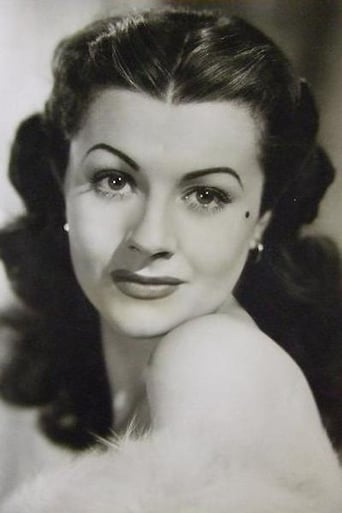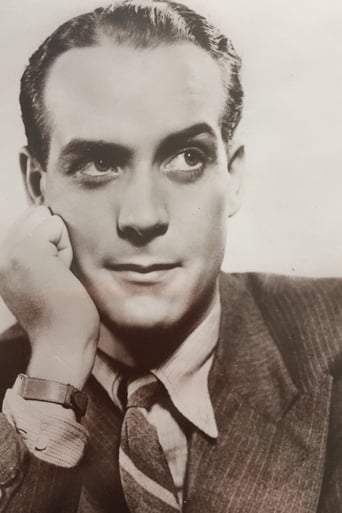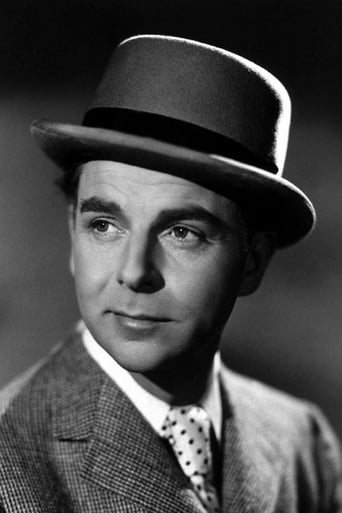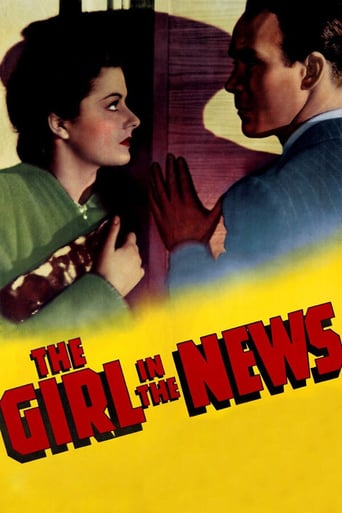
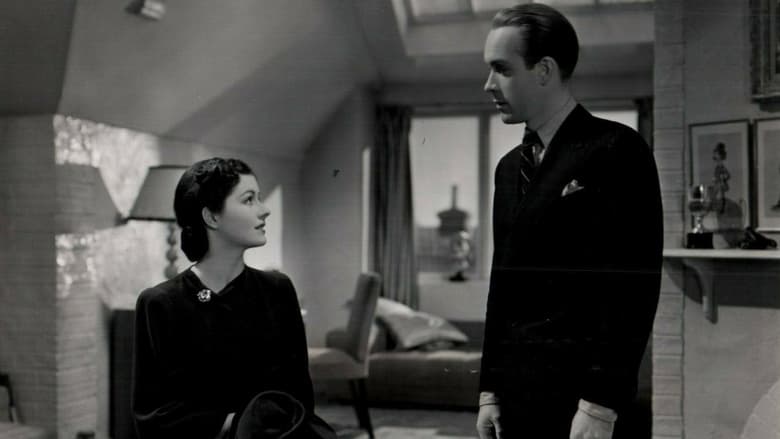
Girl in the News (1940)
An elderly lady manages to sneak some pills away from her nurse and dies of an overdose. The nurse is tried for murder and acquitted. Some time later the nurse, under a new name and identity, cares for a patient who also dies of an overdose. When her real identity comes out, suspicions arouses.
Watch Trailer
Cast
Reviews
Save your money for something good and enjoyable
It's funny watching the elements come together in this complicated scam. On one hand, the set-up isn't quite as complex as it seems, but there's an easy sense of fun in every exchange.
it is finally so absorbing because it plays like a lyrical road odyssey that’s also a detective story.
The film never slows down or bores, plunging from one harrowing sequence to the next.
Initially this movie was set to star Margaret Lockwood and Michael Redgrave, fresh from their success in "A Lady Vanishes" but something happened and Barry Barnes turns up as the earnest young lawyer who has a belief in the young nurse - he's okay but lacks Redgrave's charisma.After being cleared of a murder charge Nurse Graham (Lockwood) is confidant that her acquittal will be able to secure her another nursing post - but people remember the old saying "where there's smoke, there's fire"!! One day she finds a mysterious package, it is a "help wanted" section of a newspaper with a "nurse required" ad circled (that she didn't even question who would have sent it was a major hole in the story but oh well...). And since Emlyn Williams, who specialized in sinister spivs had already made an appearance at her trial, it had his handy work all over it!! Ann applies but sick of rejection uses the name Ann Lovell: she is given the job with no references and, surprise, surprise, Williams plays Tracy, the supercilious butler and also, no surprises, you know exactly where the movie is heading!!Tracy is involved with Mrs. Bentley (Margaretta Scott) whose invalid husband takes to Ann (even changing his will!!). Although he doesn't realise it, he is not long for this world and the dynamic duo think that by hiring Ann, whose nursing career is already in tatters, they have found the perfect "patsy" for their scheme. The murder seems foolproof and once again Ann is on trial for her life - all seems lost, people have heard "I didn't know he'd changed his will" all before!! - until Stephen comes up with an ingenious twist - but will it work!!Not really a work to hold up to Reed's best ie "The Fallen Idol" but despite some plot holes it runs smoothly, thanks to a solid cast. Margaret Lockwood is perfect as Ann, not really grasping what is happening to her but for me it is Emlyn Williams as the nasty Tracy who rivets the viewers attention!!Highly Recommended.
"Nurse required to attend invalid in quiet Surrey village; 22-26; hospital trained but experience in private nursing essential. Apply sending details and photograph to Mrs. Bentley, Camthorpe House, Camthorpe, Surrey." The advertisement might have added, "Also essential: Nurse must be thought guilty, even though she was acquitted at trial, of murdering a previous invalid in her care."Anne Graham (Margaret Lockwood) had gone on trial for murdering the self-centered, sick woman she had been caring for. Sleeping pills were the means; a small legacy was the motive. Everyone assumed Anne had done it done. A resourceful young barrister, Stephen Farringdon (Barry K. Barnes), was able to plant enough seeds of doubt in the jury's mind to get her off. Even he thinks she might have done it. She now finds she's unemployable. Who wants a suspected murderer for a nurse? Fortuitously, she receives in the mail a newspaper with an advertisement for a nurse. The location is in Surrey, some way from London. She applies, is interviewed, and is hired. She is to take care of a wealthy older man, Mr. Bentley, who is confined to a wheelchair. The man's attractive wife, Mrs. Bentley, is most solicitous. Tracy the butler watches it all. And then we realize that the butler had been present at Anne's trial.As you might suppose, it's not long before Mr. Bentley has died from an overdose of sleeping pills. A codicil to his will gives a small legacy to Anne. And now the police are convinced Anne killed both of her patients. Fortunately, Stephen Farringdon has cast aside his original doubt. He finds himself falling in love with Anne, and he is shrewd enough to think this second murder is a clever plot to make Anne look guilty while the real killers, who now will be wealthy, move on.There are no plot surprises. This is a "How's she going to get out of this" mystery. For the first 35 minutes, we have the set up. For the last 45 minutes, the extrication. Much depends on the appeal of Margaret Lockwood. In the Forties she became one of Britain's greatest stars. It was hard to beat her as a plucky, intelligent heroine or as a manipulating villain. Either way, she was an immensely likable personality. Others in the cast speak to the great depth of acting Britain could put in its films when it chose to. Roger Livesey plays a detective, Farringdon's friend, and he brings a lot of charm to the film. He has that inimitable voice, husky, friendly, and a little skeptical. In small parts, often unbilled, are such fine actors as Roland Culver, Leo Genn, Mervyn Johns, Felix Aylmer and Basil Radford. Unfortunately, the movie suffers because neither the male lead nor the villain strikes many sparks. It's particularly unlikely that Tracy, small, smug and supercilious, would be any woman's hetero heartthrob. And Farringdon is one of those lean, polite, cultured types who seem to think a second glass of sherry might be too exciting for their girl friends. The movie would benefit, in my view, by having two strong, attractive actors dealing with Margaret Lockwood.Carol Reed gives us a clever murder thriller with some nice touches, from a black kitten tugging at the hem of a night dress while a petulant, sick woman slowly creeps her way to the medicine chest, to a humorous bit of misdirection involving a detective and a crook. Reed and screenwriter Sidney Gilliat know how to create characters that have enough detail to be interesting. Gilliat, who with his partner, Frank Launder, either together or separately, either working as writer, director or producer, or in any combination, were responsible for some great Forties movies, too: Green for Danger, The Belles of St. Trinian's. I See a dark Stranger, The Rake's Progress, The Lady Vanishes, Night Train to Munich, among others.
Most film fans will have seen "The Wicked Lady"(1945) before they see this 1940 film.It was surely in playing roles like nurse Anne Graham which convinced casting directors and producers that Margaret Lockwood would be ideal in her most famous role as Lady Barbara Skelton & Highwaywoman. Another reviewer mentions prejudice and it shows that society still believes "there is no smoke without fire".To get a job (even though you have been aquitted of murder) especially in a caring job like nursing, it is sad that it is necessary to change your name because prejudice lingers on in the mind of society.However in Hollywood U.S.A. and in other rich countries, it cynically seems that if you are rich and famous you can never be found guilty of a serious crime let alone serve time in prison when one can afford high priced lawyers to get yourself aquitted.So often the lower (and impecunious) social orders feel the full weight of the law.But here Anne Graham's lawyer for once is the hero.He bamboozles the villain to give himself away to justice using a neat bluff in court!Nice to see Roger Livesey playing the detective.His most remembered role is the doctor in "A Matter of Life & Death"(1946) and "The Secret Life of Colonel Blimp" both Powell & Preesburger films.
Core to the plot is the extent to which a justifiable acquittal at a trial nevertheless prejudices the accused's future life. Given modern day concerns over sensational press coverage this is an issue as valid today (probably more so) than it was in war-time Britain. But the film does not follow this line, rather it presents us with a good old-fashioned courtroom drama, culminating in a finale of which Perry Mason would have been proud. Quite how the hero lawyer manages this stretches the judicial imagination somewhat, especially with a flawed witness, whose evidence clinches the outcome, not having to testify from the witness box.Despite these reservations this is an enjoyable enough production which canters along at a good pace without any pretensions to high art. And it was nice to see some early work from two actresses, Irene Handl (particularly malevolent as the first "victim") and Kathleen Harrison, who both went on to greater things in post-war British TV.
